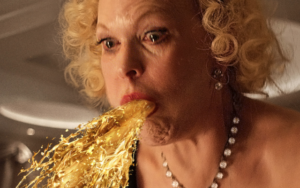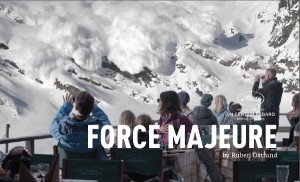TRIANGLE OF SADNESS: 3 STARS. “An audacious mix of Luis Buñuel and ‘South Park.’”
 There is nothing subtle in “Triangle of Sadness,” Swedish filmmaker Ruben Östlund’s over-the-top tale of hypocrisy, greed, and ambition, now playing in theatres.
There is nothing subtle in “Triangle of Sadness,” Swedish filmmaker Ruben Östlund’s over-the-top tale of hypocrisy, greed, and ambition, now playing in theatres.
Divided into three sections, it begins with an examination of the dynamic between men and women, in the form of supermodels Carl (Harris Dickinson) and Yaya (Charlbi Dean, who passed away at age 32 in August). At dinner they fight over the bill when she makes no effort to pony up cash, even though she makes much more money than he does. In their superficial world, the real currencies are good looks and social media followers, she thinks, but he feels if they are to truly be equals, they mustn’t let money come between them, with one lording their wealth over the other.
The second, must-be-seen-to-be-believed, sequence is social satire of the highest and grisliest order. Set aboard a luxury yacht, Carl and Yaya, invited because they are well-known, beautiful people, are joined by a rogue’s gallery of ultra-rich folks used to flaunting their privilege. “The success of a luxury cruise mainly depends on you,” says staff leader Paula (Vicki Berlin) to her team. “I don’t want to hear anybody saying, ‘No.’ It’s always, ‘Yes sir! Yes ma’am!’”
At the helm is Captain Thomas Smith (Woody Harrelson), a drunken American communist, who deliberately schedules the fancy Captain’s Dinner during a patch of very rough weather. As the waves rock the ship, the motion of the ocean coupled with some spoiled seafood, lead to mass sea sickness, and a ballet of bodily fluids.
Both sections dovetail into an apocalyptic third sequence that examines social hierarchies, and what can happen when the powerless get a taste of control.
There is nothing subtle in this over-the-top tale of ambition, power and entitlement. The social satire is as delicate as a punch to the jaw and is not for the faint of heart, but not simply because the satire cuts so deep.
The middle section, the captain’s dinner sequence, turns into a burlesque of barf so vivid it makes the Mr. Creosote sequence from “Monty Python’s The Meaning of Life” seem restrained. Rarely have bodily fluids been so celebrated on screen. It’s a lot, and its message that these wealthy folks are messy, gross humans, is not subtle, but you have to admire Östlund’s commitment to the bit.
Heavy handed as it may be, “Triangle of Sadness” is a singular film. An audacious mix of Luis Buñuel and “South Park,” although often grotesque, it entertains and provokes thought.

